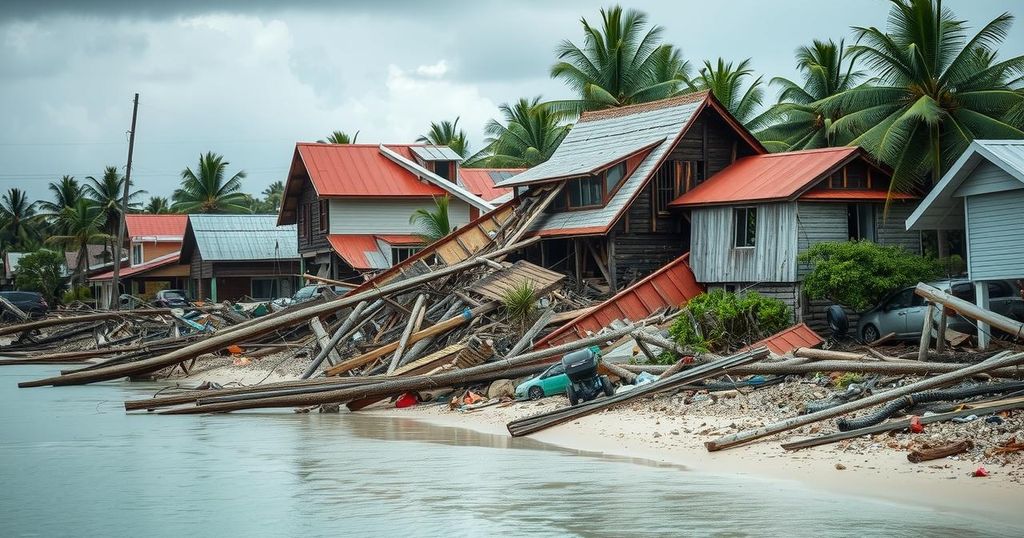Cyclone Chido has resulted in at least eleven fatalities in Mayotte, with fears of more casualties as it moves toward Mozambique. The cyclone, now categorized as a level 4 storm, has caused significant destruction, particularly to public infrastructure. Emergency responses involving police and rescue teams are ongoing to assist those affected in the region.
At least eleven casualties have been confirmed in Mayotte, a French territory located in the Indian Ocean, due to the devastation wrought by Cyclone Chido. Reported by France’s Interior Ministry, this powerful cyclone has made landfall on the east coast of Africa, raising concerns of further fatalities and destruction, particularly in northern Mozambique. The local hospital in Mayotte has indicated that nine individuals are in critical condition among 246 reported injuries.
Cyclone Chido swept through the southeastern Indian Ocean, directly impacting Mayotte, as well as the nearby islands of Comoros and Madagascar. Officials have reported that this cyclone represents the worst such event to strike Mayotte in nearly ninety years. French Interior Minister Bruno Retailleau expressed concerns about the death toll, indicating potential for significantly higher numbers of casualties caused by this calamity.
Prime Minister François Bayrou noted that vital public infrastructure, including the main hospital and airport, has sustained severe damage. The cyclone recorded winds exceeding 220 kilometers per hour, categorizing it as a formidable category 4 cyclone. Furthermore, Mayotte, which is home to over 300,000 inhabitants, stands as France’s least economically developed island and the poorest territory in the European Union, exacerbating the challenges faced by local communities, many of whom reside in precarious housing.
The response to this disaster has involved the deployment of 1,600 police and gendarmerie officers to assist the local population and to mitigate the risk of looting. Additionally, support forces of rescuers and firefighters from France and the nearby territory of Reunion have been dispatched to Mayotte. Military aircraft and vessels are also mobilizing supplies to the affected region.
French President Emmanuel Macron is actively overseeing developments, while Pope Francis has extended his prayers to the cyclone victims during a visit to Corsica. Cyclone Chido has progressed onto the African mainland, where emergency officials in northern Mozambique anticipate that up to 2.5 million people may be impacted across two provinces. UNICEF has reported significant destruction of homes and essential health services in Cabo Delgado province, underscoring the urgent need for support to recuperate from the cyclone’s impact.
As the cyclone season unfolds from December to March, southern Africa has previously endured a series of devastating cyclones. Past cyclones, such as Idai in 2019, have claimed thousands of lives and highlighted the vulnerability of impoverished nations to climate-related disasters. Increasingly intense cyclones are attributed to climate change—an issue primarily caused by wealthier countries—which calls for significant international assistance to affected nations.
Cyclone Chido represents a critical climatic event affecting regions typically prone to tropical cyclones, particularly in the Indian Ocean. Cyclones pose risks not only from the immediate destructive forces of wind and water but also through long-term humanitarian challenges, particularly in economically disadvantaged areas like Mayotte. Previous cyclones in the region have resulted in significant loss of life and disruptions to essential services, emphasizing the need for comprehensive climate strategy and disaster response initiatives.
In summary, Cyclone Chido has led to a tragic loss of life and extensive damage in Mayotte, emphasizing the vulnerability of the region to natural disasters exacerbated by climate change. The response from French authorities reflects the pressing need for emergency intervention amidst fears of rising casualty numbers and infrastructural ruin. The broader implications for neighboring regions as Cyclone Chido progresses underscore a call for sustained international aid in the face of increasingly severe climatic events.
Original Source: www.seattletimes.com






